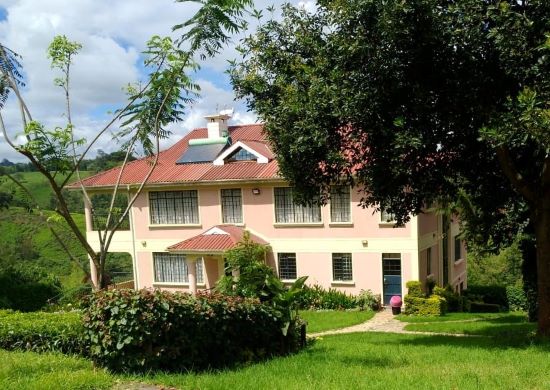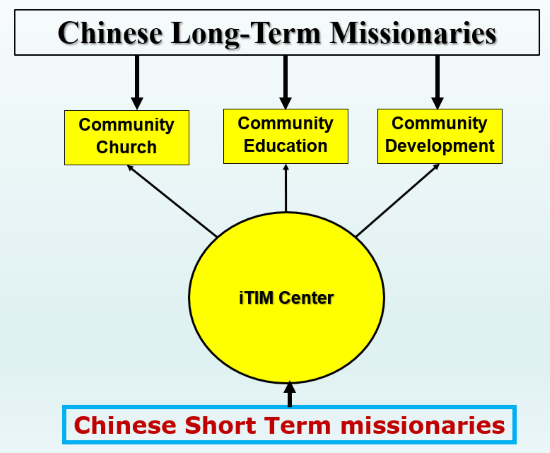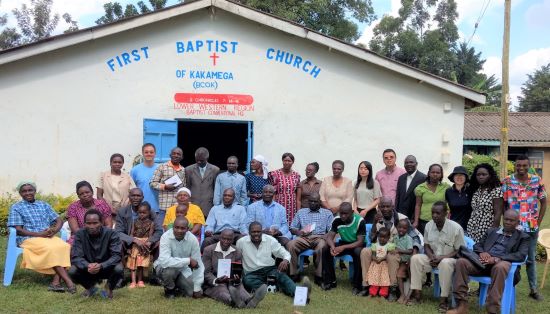At 2:00 am on June 21, 2019, three short-term mission (STM) teams from the United States arrived at the office of Chinese Diaspora Mission (CDM) in Kenya after a journey of nearly 30 hours. It was the Chinese lunar summer solstice, the longest day of the year, but for the country on the equator, there was no difference in day length. As I (Joey) set foot in Africa for the first time, I had a feeling of returning to my hometown.

The CDM head office in East Africa is in Limuru, Kenya, a small town on an equatorial plateau, more than 2,000 meters above sea level, about 30 km north-west of Kenya’s capital, Nairobi. Because of the high altitude and rainy season in East Africa, the air was cool and pleasant, not as hot as I had imagined Africa would be. Located on a hillside, the CDM office nestled in among vibrant green tea plants. Tall avocado trees stood in the grassy courtyard. Our fourteen STM team members, including ten church pastors and Bible teachers and four youth leaders from three Chinese churches in Chicago and Pittsburgh, settled into our living quarters there. This STM trip was a response to the call to cross-cultural mission, as well as to support and care for our Chinese missionaries in Africa.
Before our travel, we had three pre-trip training sessions. We learned that Chinese make up the largest diaspora group in the world, with forty-six million people spread across the globe, two million of whom are in Africa. The diaspora Chinese have abundant resources, including personnel and finances, enabling them to access different cultures and participate in world missions. In response to the calls from African churches, a missional model has been established by CDM in Africa. This model will mobilize Chinese churches in North America and mainland China to send short-term and long-term missionaries and raise up diaspora Chinese missionaries from their workplaces in Africa.
There are two main parts of the model: First is a mission of discipleship embodied by the Institute for Training in Ministry (iTIM) center. The goal of the iTIM center is to provide systematic theological training and discipleship using the iTIM curriculum that has been designed and adapted for local African church pastors and leaders. It utilizes a 3-H methodology: Head, Heart, and Hands, representing theology, spirituality, and ministry application, respectively. The learning process consists of group study with CDM’s unique workbooks, completed in two years. The certified trainers are mainly short-term missionaries from diaspora Chinese churches in North America.
The second part of the model consists of missions of empowerment in three areas:

Church planting in local communities. Trained African pastors will use iTIM methods for church planting and discipleship, with Chinese long-term missionaries working alongside them to grow their indigenous churches.
Schools in the communities. Rather than simply donating money to Africans in need, Chinese churches will invest in schools as missions to end illiteracy and equip people to work so that Africans can have freedom from ignorance, tyranny, and dependence. Local church leaders will receive training in computer technology and business administration, and Chinese language study can be added to the curriculum.
Community business development. Chinese Christian businessmen may start joint ventures with trained African church leaders. The indigenous people can find jobs in these workplaces and benefit from business profits. In five to seven years, the Chinese missionaries will exit the businesses, and the local African people will eventually operate the businesses independently.
Our two-week STM missions schedule was set according to the mission and vision of CDM. It was very tight and diverse, including an African Pastors’ Retreat; Discipleship iTIM leader certification training; Chinese church services in Ethiopia, Tanzania, and Kenya; Maasai Women’s Ministry; and an African Pastors’ Wives’ Retreat, being completed by several breakouts.

In the first small team I was assigned to lead the African Pastors’ Retreat, and in the second small team I served in a Discipleship iTIM Leader certification training at Kakamega Seminary as well as in a demonstration of iTIM discipleship group leading at a Chinese church in Nairobi. These services are centered around iTIM’s discipleship program. East African countries have many Christians, but the roots of faith are not very solid due to lack of education and resources. Most church pastors have no systematic theological training, self-describing their beliefs as being “a mile wide and an inch deep.” Therefore, CDM’s training courses for church pastors and leaders are critical and important.
What impressed me most was Kenyans’ godliness and love for God, which is worth emulating. Most shops are closed on Sundays so local believers can go to church and worship. They truly dedicate the day to worship God in sharp contrast to Chinese Christians in the United States, many of whom work, schedule their children’s activities on Sundays, or only show up at sermon time. African Christians go to church very early, some even two hours prior to the service; they wear their best clothes, appearing well dressed, even if most of their clothes are from the second-hand market. I asked one sister: “Why don’t you save the cost of the clothes and buy food?” She answered with a confident smile: “I want to give my best to God!” Church facilities are limited, and many churches do not have projectors or pianos, but an African drum and a cymbal can bring the atmosphere of worship to the whole church and God blesses their music. Groups of adults, youth and children sing in worship without instruments. I could not control my tears when listening to the rich tonalities and harmony of the song “You are so Great” in Swahili.
Because of poverty in Kenya, even full-time pastors find it difficult to survive on only the salary from their churches, so most pastors need an additional job to support their families. For example, many of the pastors we served in the retreats also work farmland and raise livestock. We understood through the STM trip that local pastors need not only spiritual food and discipleship, but also practical help, and this cannot be done by simply giving money. Because Africa is indeed relatively poor, small (to us) amounts of money given directly to pastors can easily lead them into temptations, and sometimes their mission is also affected. We were told several heartbreaking stories during the pre-trip training. For example, one pastor left during the training when he received 600 USD from a STM member. He believed the easy money was better than continuing with church ministry and training. We need to help local churches in Africa stand on their own feet, not just give them money. While fundraising may not be a major problem for Chinese churches in North America, using money wisely to help local churches and pastors in Africa develop themselves and become independent is certainly a huge challenge.
CDM’s long-term missionaries in the field also impressed us. For example, Lily, in charge of the meals during our STM trip, was very considerate and humble, serving us quietly. Later we learned she was from Shanghai, called by God to come to Africa as a long-term missionary. The day after we arrived, Lily’s mother passed away in China. At one point she was so sad that she could not keep back tears. However, she decided to stay and help us instead of returning home. She insisted on continuing to prepare meals for us, even while fasting herself for the next few days. I know that she was able to do this only through the touch and comfort of God himself.
During the two-week STM work in Kenya, I found that most parts of Kenya we visited have no public running water or sewage system. I discovered that the water and power supply systems are also unstable in Kenya. On at least three occasions I found myself without water or electricity while taking a shower, causing embarrassment. If the missionary has a family with children, there are practical challenges of childcare and schooling in addition to cross-culture missions. It reminded me that missionaries in the field face real difficulties and challenges that we cannot imagine from afar. Many things that are easy and taken for granted by us in the United States result in pressures and emotional needs that we cannot imagine. How do we really care for our missionaries and accomplish God’s mission with them?
In all, the innovative mission model of CDM can empower the indigenous population and transform culture in Africa. It is God’s mission and can be fulfilled in partnership with God’s people, including Chinese churches, full-time missionaries, STM teams, and local African church leaders. As an African proverb says, “If you want to go fast, go alone. If you want to go far, go together.” Churches, mission organizations, and Africa field workers need to work together in mission partnership and missionary member care.
Images courtesy of the authors.
Joey Zhou
Joey Zhou was born in China and came to the US in 2003. In May 2012, nine years after he first heard the gospel, he became a Jesus follower. He is the father of two sons and deeply passionate about spreading the gospel to his friends, neighbors and all nations.View Full Bio
David Fu
Growing up, David Fu had many diaspora experiences, moving frequently with his geologist parents. He met Jesus while pursuing his PhD in Nebraska in 1997 and has since determined to serve him at his professional workplace. He has participated in STM trips and is now a coworker for CDM missions …View Full Bio